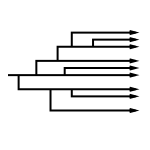Dickimaw Books Blog 
Localisation 🔗

[Previously posted on Goodreads 2018-07-26.] The chances are that you’re reading this in a web browser. Perhaps it has a menu bar along the top with words like ‘Bookmarks’ or ‘History’, or perhaps it has a hamburger style menu that appears when you click on a button with three horizontal lines. However you interact with an application, the instructions are provided in words or pictures (or a combination). Commonly known icons, such as a floppy disk or printer, are easy to understand for those familiar with computers, but more complex actions, prompts, and warning or error messages need to be written in words.
For example, if you want to check your email, there might be a message that says ‘1 unread email(s)’ or ‘2 unread email(s)’. If the software is sophisticated, it might be able to say ‘1 unread email’ or ‘2 unread emails’. Naturally, you’ll want this kind of information to be in a language you can understand. Another user may be using the same application in, say, France or Germany, in which case they’ll probably want the messages in French or German.
An application that supports localisation is one that is designed to allow such textual information to be displayed in different languages, and (where necessary) to format certain elements, such as dates or currency, according to a particular region. This support is typically provided in a file that contains a list of all possible messages, each identified by a unique key. Adding a new language is simply a matter of finding someone who can translate those messages and creating a new file with the appropriate name.
The recommended way of identifying a particular language or region is with an ISO code. The ISO 639-1 two-letter code is the most commonly used code to identify root languages, such as ‘en’ for English, ‘fr’ for French and ‘de’ for German. (Languages can also be identified by three-letter codes or numeric codes.) The language code can be combined with an ISO 3166 country code. For example, ‘en-GB’ indicates British English (so a printer dialogue box might ask if you want the ‘colour’ setting), ‘en-US’ indicates US English (‘color’) and ‘fr-CA’ indicates French Canadian (‘couleur’).
On Friday 20th July 2018, Paulo Cereda presented the newly released version 4.0 of his arara tool at the TeX User Group (TUG) 2018 conference in Rio de Janeiro. For those of you who have read my LaTeX books, I mentioned arara in Using LaTeX to Write a PhD Thesis and provided further information in LaTeX for Administrative Work. This very useful tool for automating document builds has localisation support for English, German, Italian, Dutch, Brazilian Portuguese, and — Broad Norfolk.
Wait! What was that?
Broad Norfolk is the dialect spoken in the county of Norfolk in East Anglia. There’s a video of Paulo’s talk available. If you find it a bit too technical but are interested in the language support, skip to around time-frame 18:50. Below are some screenshots of arara in action. (It’s a command line application, so there’s no fancy point and click graphical interface.)
Here’s arara reporting a successful job (converting the file test.tex to test.pdf) with the language set to Broad Norfolk:

For those who can’t see the image, the transcript is as follows:
Hold yew hard, ole partner, I'm gornta hev a look at 'test.tex' (thass 693 bytes big, that is, and that was last chearnged on 07/26/2018 12:09:08 in case yew dunt remember). (PDFLaTeX) PDFLaTeX engine ..... THASS A MASTERLY JOB, MY BEWTY (Bib2Gls) The Bib2Gls sof....... THASS A MASTERLY JOB, MY BEWTY (PDFLaTeX) PDFLaTeX engine ..... THASS A MASTERLY JOB, MY BEWTY Wuh that took 1.14 seconds but if thass a slight longer than you expected, dunt yew go mobbing me abowt it cors that ent my fault. My grandf'ar dint have none of these pearks. He had to use a pen and a bit o' pearper, but thass bin nice mardling wi' yew. Dew yew keep a troshin'!
For comparison, the default English setting produces:

For those who can’t see the image, the transcript is as follows:
Processing 'test.tex' (size: 693 bytes, last modified: 07/26/2018 12:09:08), please wait. (PDFLaTeX) PDFLaTeX engine .............................. SUCCESS (Bib2Gls) The Bib2Gls software .......................... SUCCESS (PDFLaTeX) PDFLaTeX engine .............................. SUCCESS Total: 1.18 seconds
For a bit of variety, I then introduced an error that causes the second task (Bib2Gls) to fail. Here’s the Broad Norfolk response:
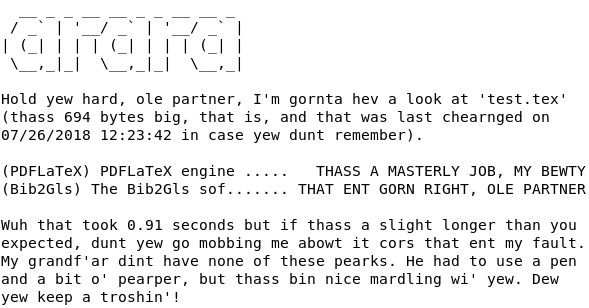
For those who can’t see the image, the transcript is as follows:
Hold yew hard, ole partner, I'm gornta hev a look at 'test.tex' (thass 694 bytes big, that is, and that was last chearnged on 07/26/2018 12:23:42 in case yew dunt remember). (PDFLaTeX) PDFLaTeX engine ..... THASS A MASTERLY JOB, MY BEWTY (Bib2Gls) The Bib2Gls sof....... THAT ENT GORN RIGHT, OLE PARTNER Wuh that took 0.91 seconds but if thass a slight longer than you expected, dunt yew go mobbing me abowt it cors that ent my fault. My grandf'ar dint have none of these pearks. He had to use a pen and a bit o' pearper, but thass bin nice mardling wi' yew. Dew yew keep a troshin'!
For comparison, the default English setting produces:
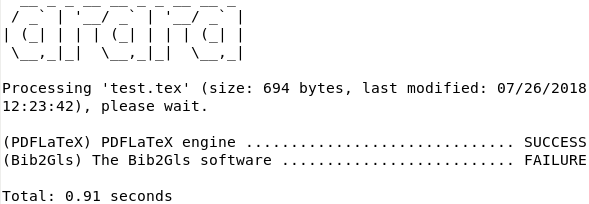
For those who can’t see the image, the transcript is as follows:
Processing 'test.tex' (size: 694 bytes, last modified: 07/26/2018 12:23:42), please wait. (PDFLaTeX) PDFLaTeX engine .............................. SUCCESS (Bib2Gls) The Bib2Gls software .......................... FAILURE Total: 0.91 seconds
Here’s the help message in Broad Norfolk:
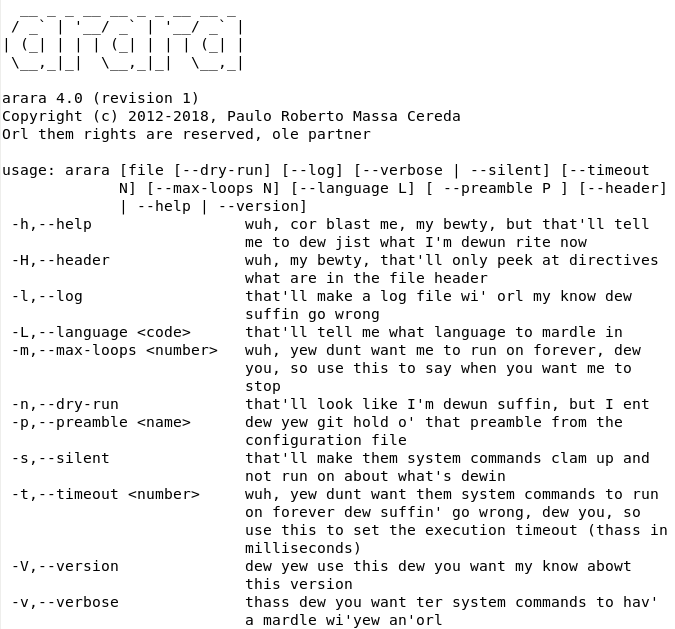
For those who can’t see the image, the transcript is as follows:
arara 4.0 (revision 1)
Copyright (c) 2012-2018, Paulo Roberto Massa Cereda
Orl them rights are reserved, ole partner
usage: arara [file [--dry-run] [--log] [--verbose | --silent] [--timeout
N] [--max-loops N] [--language L] [ --preamble P ] [--header]
| --help | --version]
-h,--help wuh, cor blast me, my bewty, but that'll tell
me to dew jist what I'm dewun rite now
-H,--header wuh, my bewty, that'll only peek at directives
what are in the file header
-l,--log that'll make a log file wi' orl my know dew
suffin go wrong
-L,--language that'll tell me what language to mardle in
-m,--max-loops wuh, yew dunt want me to run on forever, dew
you, so use this to say when you want me to
stop
-n,--dry-run that'll look like I'm dewun suffin, but I ent
-p,--preamble dew yew git hold o' that preamble from the
configuration file
-s,--silent that'll make them system commands clam up and
not run on about what's dewin
-t,--timeout wuh, yew dunt want them system commands to run
on forever dew suffin' go wrong, dew you, so
use this to set the execution timeout (thass in
milliseconds)
-V,--version dew yew use this dew you want my know abowt
this version
-v,--verbose thass dew you want ter system commands to hav'
a mardle wi'yew an'orl
For comparison, the default English setting produces:
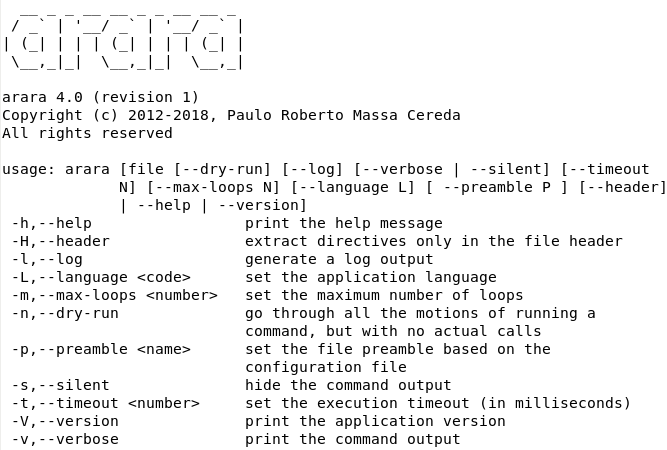
For those who can’t see the image, the transcript is as follows:
arara 4.0 (revision 1)
Copyright (c) 2012-2018, Paulo Roberto Massa Cereda
All rights reserved
usage: arara [file [--dry-run] [--log] [--verbose | --silent] [--timeout
N] [--max-loops N] [--language L] [ --preamble P ] [--header]
| --help | --version]
-h,--help print the help message
-H,--header extract directives only in the file header
-l,--log generate a log output
-L,--language set the application language
-m,--max-loops set the maximum number of loops
-n,--dry-run go through all the motions of running a
command, but with no actual calls
-p,--preamble set the file preamble based on the
configuration file
-s,--silent hide the command output
-t,--timeout set the execution timeout (in milliseconds)
-V,--version print the application version
-v,--verbose print the command output
In case you’re wondering why Broad Norfolk was included, Paulo originally asked me if I could add a slang version of English as an Easter egg, but I decided to take advantage of this request and introduce Broad Norfolk to the international TeX community as it’s been sadly misrepresented in film and television, much to the annoyance of those who speak it. As far as we know, it’s the only application that includes Broad Norfolk localisation support. (If you know of any other, please say!)
Having decided to add Broad Norfolk, we needed to consider what code to use. The ISO 3166-1 set includes a sub-set of user-assigned codes provided for non-standard territories for in-house application use. These codes are AA, QM to QZ, XA to XZ, and ZZ. I chose ‘QN’ and decided it’s an abbreviation for Queen’s Norfolk, as the Queen has a home in Norfolk.
Next Post
Previous Post
 I had an interesting encounter with a couple of children as I was heading back into the village after walking around the muddy footpaths and byways around the area.
I had an interesting encounter with a couple of children as I was heading back into the village after walking around the muddy footpaths and byways around the area.Recent Posts
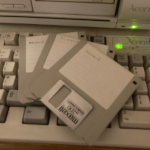 There are a growing number of digital historians who are interested in documenting old computing systems from the twentieth century, but much of the information has been lost and coincident names can make it hard to search. This article is about the RISC OS ARMTeX distribution, which provided TeX and LaTeX for the ARM-powered Acorn computers in the 1990s.
There are a growing number of digital historians who are interested in documenting old computing systems from the twentieth century, but much of the information has been lost and coincident names can make it hard to search. This article is about the RISC OS ARMTeX distribution, which provided TeX and LaTeX for the ARM-powered Acorn computers in the 1990s.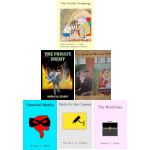 The DRM-free ebook retailer SmashWords has its annual Summer/Winter sale from 1st – 31st July 2025. My crime novel “The Private Enemy” and children’s illustrated story “The Foolish Hedgehog” both have a 50% discount, and my crime fiction short stories “I’ve Heard the Mermaid Sing”, “Unsocial Media”, “Smile for the Camera”, and “The Briefcase” have a 100% discount (i.e. free!) for the duration of the sale. Did you know that you can gift ebooks on SmashWords?
The DRM-free ebook retailer SmashWords has its annual Summer/Winter sale from 1st – 31st July 2025. My crime novel “The Private Enemy” and children’s illustrated story “The Foolish Hedgehog” both have a 50% discount, and my crime fiction short stories “I’ve Heard the Mermaid Sing”, “Unsocial Media”, “Smile for the Camera”, and “The Briefcase” have a 100% discount (i.e. free!) for the duration of the sale. Did you know that you can gift ebooks on SmashWords? If you have read my short story Smile for the Camera, did you notice that the ending could have two possible interpretations? (No spoilers please!) As a writer, it’s always difficult to tell if something is too obvious or too obscure. If you need a hint, consider the naming scheme and remember that not everyone is what they say or imply that they are.
If you have read my short story Smile for the Camera, did you notice that the ending could have two possible interpretations? (No spoilers please!) As a writer, it’s always difficult to tell if something is too obvious or too obscure. If you need a hint, consider the naming scheme and remember that not everyone is what they say or imply that they are. The Ex-Cathedra writing group were delighted to present a cheque for £1,400 to St Martins Housing Trust during their collection at Tesco Harford Bridge on 6th December 2024. The money was raised from sales of the book Tales for Our Times, an anthology of short stories written by the group. The cheque was received by Ian Hanwell on behalf of St Martins. Many thanks to the support of everyone who purchased a copy and to the staff at Tesco Harford Bridge for allowing us to make the presentation there.
The Ex-Cathedra writing group were delighted to present a cheque for £1,400 to St Martins Housing Trust during their collection at Tesco Harford Bridge on 6th December 2024. The money was raised from sales of the book Tales for Our Times, an anthology of short stories written by the group. The cheque was received by Ian Hanwell on behalf of St Martins. Many thanks to the support of everyone who purchased a copy and to the staff at Tesco Harford Bridge for allowing us to make the presentation there. Search Blog
📂 Categories
- Autism
- Books
- Children’s Illustrated Fiction
- Illustrated fiction for young children: The Foolish Hedgehog and Quack, Quack, Quack. Give My Hat Back!
- Creative Writing
- The art of writing fiction, inspiration and themes.
- Crime Fiction
- The crime fiction category covers the crime novels The Private Enemy and The Fourth Protectorate and also the crime short stories I’ve Heard the Mermaid Sing and I’ve Heard the Mermaid Sing.
- Fiction
- Fiction books and other stories.
- Language
- Natural languages including regional dialects.
- (La)TeX
- The TeX typesetting system in general or the LaTeX format in particular.
- Music
- Norfolk
- This category is about the county of Norfolk in East Anglia (the eastern bulgy bit of England). It’s where The Private Enemy is set and is also where the author lives.
- RISC OS
- An operating system created by Acorn Computers in the late 1980s and 1990s.
- Security
- Site
- Information about the Dickimaw Books site.
- Software
- Open source software written by Nicola Talbot, which usually has some connection to (La)TeX.
- Speculative Fiction
- The speculative fiction category includes the novel The Private Enemy (set in the future), the alternative history novel The Fourth Protectorate, and the fantasy novel Muirgealia.
🔖 Tags
- Account
- Alternative History
- Sub-genre of speculative fiction, alternative history is “what if?” fiction.
- book samples
- Bots
- Conservation of Detail
- A part of the creative writing process, conservation of detail essentially means that only significant information should be added to a work of fiction.
- Cookies
- Information about the site cookies.
- Dialect
- Regional dialects, in particular the Norfolk dialect.
- Docker
- Education
- The education system.
- Ex-Cathedra
- A Norfolk-based writing group.
- Fantasy
- Sub-genre of speculative fiction involving magical elements.
- File formats
- FlowframTk
- A vector graphics application written in Java that can export to pgf picture drawing code but can also be used to construct frames for use with the flowfram package. Home page: dickimaw-books.com/software/flowframtk. (FlowframTk was originally called JpgfDraw.)
- Hippochette
- A pochette (pocket violin) with a hippo headpiece.
- History
- I’ve Heard the Mermaid Sing
- A crime fiction short story (available as an ebook) set in the late 1920s on the RMS Aquitania. See the story’s main page for further details.
- Inspirations
- The little things that inspired the author’s stories.
- Linux
- Migration
- Posts about the website migration.
- Muirgealia
- A fantasy novel. See the book’s main page for further details.
- News
- Notifications
- Online Store
- Posts about the Dickimaw Books store.
- Quack, Quack, Quack. Give My Hat Back!
- Information about the illustrated children’s book. See the book’s main page for further details.
- Re-published
- Articles that were previously published elsewhere and reproduced on this blog in order to collect them all together in one place.
- Sale
- Posts about sales that are running or are pending at the time of the post.
- Site settings
- Information about the site settings.
- Smile for the Camera
- A cybercrime short story about CCTV operator monitoring a store’s self-service tills who sees too much information.
- Story creation
- The process of creating stories.
- TeX Live
- The Briefcase
- A crime fiction short story (available as an ebook). See the story’s main page for further details.
- The Foolish Hedgehog
- Information about the illustrated children’s book. See the book’s main page for further details.
- The Fourth Protectorate
- Alternative history novel set in 1980s/90s London. See the book’s main page for further details.
- The Private Enemy
- A crime/speculative fiction novel set in a future Norfolk run by gangsters. See the book’s main page for further details.
- Unsocial Media
- A cybercrime fiction short story (available as an ebook). See the story’s main page for further details.
- World Book Day
- World Book Day (UK and Ireland) is an annual charity event held in the United Kingdom and the Republic of Ireland on the first Thursday in March. It’s a local version of the global UNESCO World Book Day.
- World Homeless Day
- World Homeless Day is marked every year on 10 October to draw attention to the needs of people experiencing homelessness.

